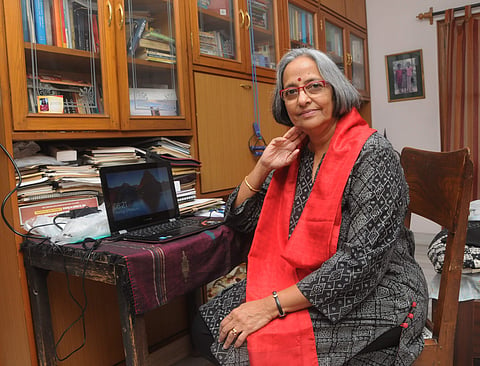

Most of us get our daily dose of the news through the morning newspaper (or scroll through our social media feed for it) and express remorse or anger inwardly, and sometimes outwardly, upon reading frequent news of rape, dowry deaths or infanticide, which have more or less became a fixture in the newspaper. Now, you may think that this applies only to the present, but apparently not. Because even as far back as 1970, Dr Rukmini Rao was sick to her stomach of reading news like this. In fact, she and a group of women decided to get to the bottom of one particular case where a woman had been burnt to death. Soon, this informal group called themselves Saheli, extending their friendship, support and help to many such distressed women. "We had brought about around seven pro-women legislation during that time," Dr Rao recalls.
Back to roots
Dr Rao, who hails from Hyderabad, has always been a true-blue Hyderabadi who studied at Osmania University and even taught at St Francis College For Women Begumpet, but she travelled to the country capital for her higher studies. She recalls going through a lot of difficulties as she had left her house because she was unhappy. "All of this helped me reflect and I realised that women have no support structures," she says, stating that as the reason why she dedicated her life to becoming the strongest support for those women who need it the most.
Dr Rukmini Rao, Gramya Resource Center
Following her intuition, she returned to Hyderabad in 1989 and worked with the Deccan Development Society, an organisation that works for the betterment of women farmers. Her job was to develop leadership roles and one such group in the Medak district was so popular that it became an alternate dispute resolution group. Then there was the Mothers Committee. "And all this was much before the self-help group era, somewhere in '97 or '98," she shares. Soon, she went on to set up the Gramya Resource Center, which works exclusively for rural women and their rights in the districts of Nalgonda and Khammam. Believe it or not, this is just the beginning of her story.
Take note
"I am glad that some of our initiatives have been taken up by the government," says the 67-year-old, talking about the self-explanatory Child Protection Committees, which is now in about 70 villages. A mixture of teachers, members of the sarpanch, village leaders and progressive members of the village form this committee in each village.
And then there was the Sishu Grahas, where parents were encouraged to give their children up for adoption instead of throwing them in the bushes. But there was a fundamental problem with this. "What is the message that one is sending to the community? That when you don't want your children you can leave them here?" So, Gramya started providing these families with the basics — vegetables, rice and so on. "Our experiences showed us that if we could support the mother and her child initially, then the mother eventually gets attached and continues to care for her child," reasons Dr Rao.
Speaking about the education scene of such families, Dr Rao, who has dedicated 40 years of her life to the upliftment of women and rural people, explains, "Rural folk sometimes migrate seasonally; they go to other districts like Guntur to pick chillies or cotton. This disrupts the child's life. And because there is no detention policy, the child is promoted to the next class without being aware of the basics of the previous class.” Gramya has started programmes to pay attention to this issue as well.
And what of men
"The men in rural areas are desperate and distressed because they hardly have any work. And when they migrate, they lose their dignity too because they have to live on the streets. They can't vent their frustration to their employers, so it is directed towards the women and children. One has to understand the overall context," says Dr Rao, when we ask her to give us an insight into the minds of rural men. This is why Gramya believes in working with the menfolk too.
And for those who blame it all on the men, she has only one thing to say, "Stop this armchair judgment and get on the ground to understand their reality." She urges us all to step out of our comfort zone and see what we can do to improve our surroundings. "If you don't have time to get on the ground, at least open your purses and support them," she quips, especially in light of government regulations, due to which many NGOs are shutting down.
At the end of our conversation Dr Rao has one last thing to say, "The lesson I've learnt over the past 40 years in my field is that we need both men and women to save what we have."
For more about Gramya, check out gramya.org.in
